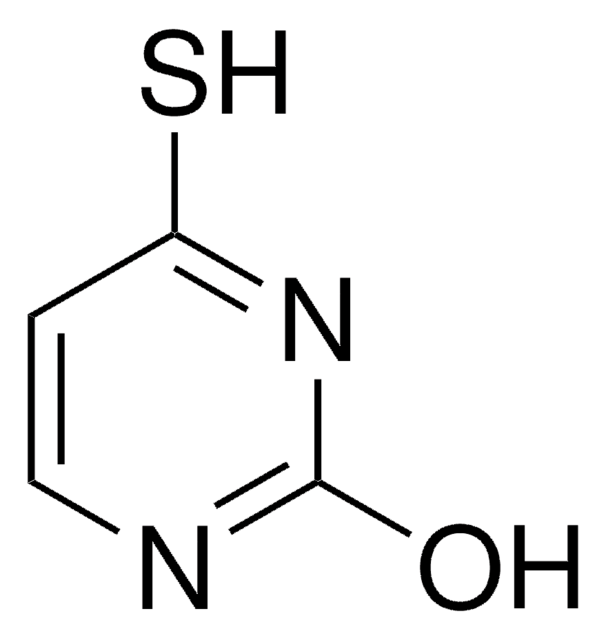Recommended Products
assay
98%
SMILES string
NC1=NC(=S)N(C=C1)[C@H]2O[C@H](CO)[C@@H](O)[C@H]2O
Choose from one of the most recent versions:
Certificates of Analysis (COA)
Lot/Batch Number
Sorry, we don't have COAs for this product available online at this time.
If you need assistance, please contact Customer Support.
Already Own This Product?
Find documentation for the products that you have recently purchased in the Document Library.
T Döring et al.
The EMBO journal, 13(11), 2677-2685 (1994-06-01)
A photo-reactive diazirine derivative was attached to the 2-thiocytidine residue at position 32 of tRNA(Arg)I from Escherichia coli. This modified tRNA was bound under suitable conditions to the A, P or E site of E.coli ribosomes. After photo-activation of the
R L Joshi et al.
FEBS letters, 208(2), 189-193 (1986-11-24)
A new approach for the fluorescence labeling of an aminoacyl-tRNA at the 3'-end is applied to study its interaction with bacterial elongation factor Tu (EF-Tu) and GTP at equilibrium. The penultimate cytidine residue in yeast tRNATyr-C-C-A was replaced by 2-thiocytidine
Hans K Lundgren et al.
Journal of bacteriology, 188(8), 3052-3062 (2006-04-06)
The cysteine desulfurase IscS in Salmonella enterica serovar Typhimurium is required for the formation of all four thiolated nucleosides in tRNA, which is thought to occur via two principally different biosynthetic pathways. The synthesis of 4-thiouridine (s(4)U) and 5-methylaminomethyl-2-thiouridine (mnm(5)s(2)U)
Akihiro Ohkubo et al.
Organic & biomolecular chemistry, 10(10), 2008-2010 (2012-01-28)
In this paper, we report DNA and 2'-OMe-RNA probes containing 5-methyl-2-thiocytidine (m(5)s(2)C) residues that can bind selectively and strongly to the corresponding RNA targets containing inosine residues by the significant stacking effect and steric hindrance of the 2-thiocarbonyl group.
D J Earnshaw et al.
Biochemistry, 39(21), 6410-6421 (2000-06-01)
The hairpin ribozyme achieves catalytic cleavage through interaction of essential nucleotides located in two distinct helical domains that include internal loops. Initial docking of the two domains is ion dependent and appears to be followed by a structural rearrangement that
Our team of scientists has experience in all areas of research including Life Science, Material Science, Chemical Synthesis, Chromatography, Analytical and many others.
Contact Technical Service








